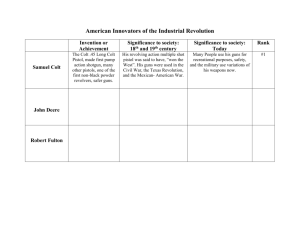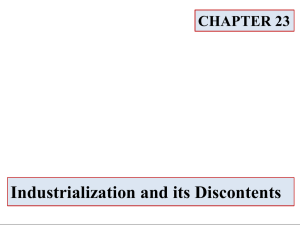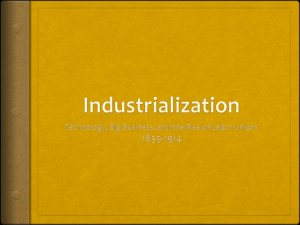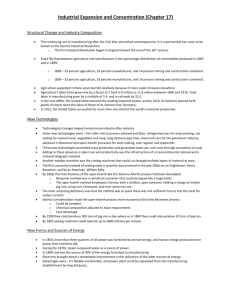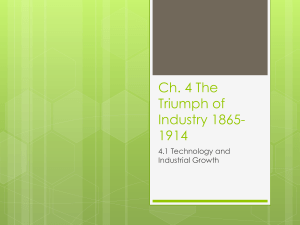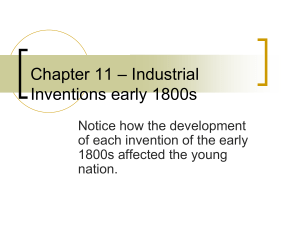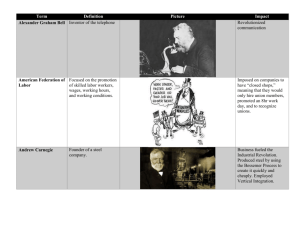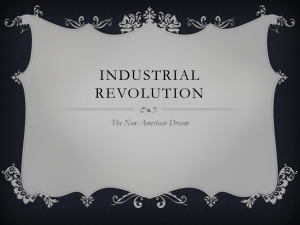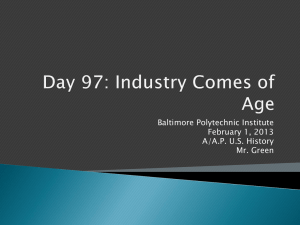Chapter 9 Section 1 The Industrial Revolution Spreads
advertisement
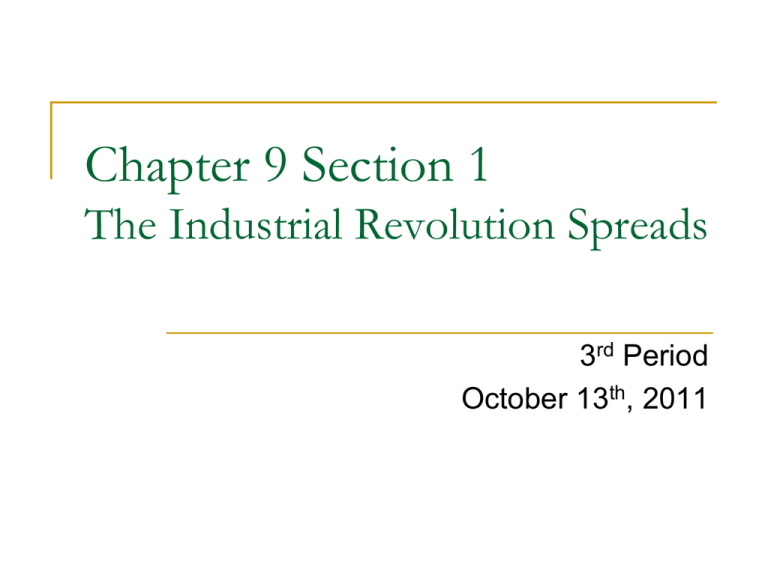
Chapter 9 Section 1 The Industrial Revolution Spreads 3rd Period October 13th, 2011 Nations Race to Industrialize (298-300) Germany and France and the United States had more abundant supplies of coal, iron and other resources then Britain did. They also had the advantage of following Britain's lead. Robert Fulton powered his steam boat with one of James Watts steam engine. By 1900s, the United States was manufacturing about 30 percent of the worlds industrial goods, surpassing Britain as the leading industrial nation. Uneven Development (298-300) Although Russia did have resources, social and political conditions slowed its economic development. Only in the 1800s, more then 100 years after Britain, did the Russian lumber toward industrialization. Although Japan lacked many basic resources, it industrialized rapidly after 1868 because of a political revolution that made modernization a priority. Pictures Effects of Industrialization (300) 1900, Britain underwent social changes, such as rapid urbanization. Men, women and children worked long hours. The factory produced huge quantities of new goods at lower prices. Demand for goods created jobs Politics changed as leaders had to meet the demands of an industrial society At a technological and economic advantage the Western powers came to dominate the world. Steel Production and the Bessemer Process (300-301) American inventor William Kelly and British engineer Henry Bessemer developed new process for making steel from iron. In 1856 Bessemer patented the process Bessemer made it lighter, harder and more durable then iron so it could be cheaply produced. Steel became the major material. In 1880, the average German steel mill produced less then 5 million metric tons of steel a year. In 1910, it reached nearly 15 million metric tons Steel Production and the Bessemer Process (300-301) Effects of Industrialization (300) Innovations in Chemistry (301) Chemist created items from aspirin to soaps and perfume. Newly developed fertilizers increased food production. Alfred Nobel invented dynamite a safer explosive used for both construction and warfare. Electric Power Replaces Steam (301) Electricity replaced steam as the dominant source of energy. Michael Faraday invented the Dynamo an electric generator. Thomas Edison invented the incandescent light bulb, which allowed people to operate after dark. New Methods of Production (301-302) Interchangeable Parts were identical parts that could be used in place of another. By the early 1900s, manufactures had introduced another new method of production. The Assembly Line. The Automobile Age Begins (302) The transportation revolution took a new turn when a German engineer, Nikolaus Otto invented a gasoline powered internal combustion engine. In 1886, Karl Benz received a patient for the first automobile, which had three wheels. Henry Ford, America took over the massproduction of cars after starting the assembly line. • Airplane Takes Flight (302) The internal combustion engine powered more than cars, it could power airplanes. Orville and Wilbur wright designed the first airplanes. Though it only flew for a few seconds it was a big improvement. Rapid Communication (302-303) American inventor Samuel F.B. Morse developed the telegraph. In 1876 the Scottish born American inventor Alexander Graham Bell patented the telephone. An Italian pioneer Guglielmo Marconi invented the radio. The radio would become a corner stone of today's global communications network. Rise of Big Business (303) To get the needed capital, owners sold stock- or shares in their companies large scale companies such as steel foundries, needed so much capital that they sold hundred of thousands of shares. These businesses formed giant corporationsBusinesses that are owned by many investors who buy shares of stock With large amounts of capital corporations could expand into many areas. Move Toward Monopolies (303-304) Powerful business leaders created monopolies for huge corporations that controlled entire industries. In Germany Alfred Krupp inherited a steel business. He made supply lines or raw materials that fed the steel business. Move Toward Regulation (304) A rise in big businesses and the creation of such good wealth created debate. Some people saw that Krupp and Rockefeller as captains of industry. They destroyed there competition, critically argued, they damaged the free-enterprise system.
